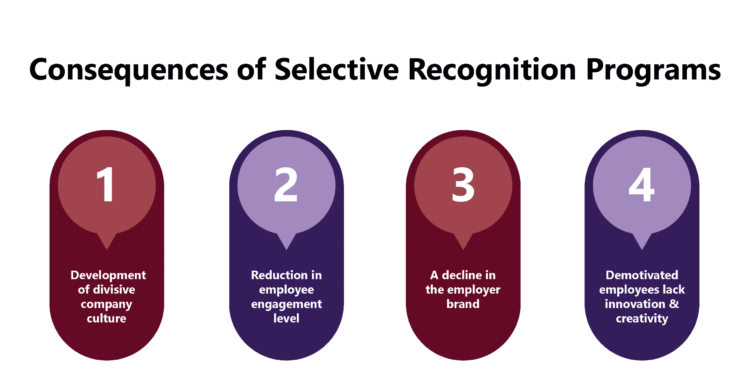1. Rewards and recognition should not be limited to entry-level employees: Recognizing only entry-level employees can demotivate tenured and senior employees who also need consistent motivation and appreciation.
2. Negative impacts of selective recognition: Focusing rewards on entry-level employees can lead to a divisive organizational culture, reduce employee engagement, harm the employer brand, and stifle innovation and creativity.
3. Broader consequences: A lack of fair recognition may lead to increased turnover, reduced productivity, and difficulty in attracting top talent, ultimately harming the organization’s growth and reputation.
4. Comprehensive recognition approach recommended: Organizations should implement inclusive rewards and recognition programs for all employees, regardless of their level, to maintain motivation, engagement, and a positive workplace culture.
Employee rewards and recognition have become critical factors in motivating and retaining employees. However, organizations often offer rewards and recognition only to entry-level employees, excluding more tenured employees. Is this the right approach? Let’s take a look.

Organizations often feel that rewarding and recognizing entry-level employees is of utmost importance.
They also believe these programs do not significantly benefit higher-level organizational employees.
They believe that experienced employees do not value such programs.

However, this is not true. Most mid and even senior-level employees also feel the need for consistent motivation and appreciation as entry-level employees.
Thus, organizations might demotivate their tenured and high-performing employees by focusing only on the newer employees for employee recognition.
Organizations with recognition programs that only apply to entry-level employees will likely experience negative impacts.
The most common consequences are as follows:
1. Divisive Organizational Culture
2. Reduction in Employee Engagement
3. Decline in the Employer Brand
4. Lack of Innovation and Creativity


One significant drawback of having a recognition system focused solely on entry-level employees is the potential for a divisive organizational culture to emerge.
Such culture is detrimental to the organization. It can breed dissent among employees and reduce cooperation and support from older employees.
It can lead to adverse business impacts due to poor communication, teamwork, and distrust among the workforce.

The absence of a fair rewards and recognition system increases the chances of disengagement, even among the most dedicated employees.
As a result, they can tend to become indifferent towards the happenings in the organization and become less productive.
The decline in engagement levels can also lead to a significant increase in employee turnover.
It can hinder the organization’s smooth business operations and erode customer trust.

Organizations that do not recognize tenured employees and recognize only entry-level employees can lose their credibility as preferred employers.
For many young professionals, recognizing and appreciating might be more valuable than any additional perks and benefits.
The absence of a proper recognition program can make them less inclined to take up job offers from such organizations.
Hence, it can hurt the organization’s brand value as a recruiter.
Hence, the organization might find it increasingly difficult to hire quality candidates for various roles.

When organizations fail to acknowledge their long-serving employees, the motivation levels of the entire workforce drop.
Employees may tend to do their work mechanically rather than feeling excited and motivated to take initiative.
Therefore, they may become less creative or innovative and may not explore new ideas and options for business growth.
Hence, it can hinder innovation and improvement, eventually leading to a loss of competitive advantage and lower business growth.
There is often a debate among HR practitioners that employee rewards and recognition programs should be targeted only at entry-level employees. However, it is best to adopt a comprehensive employee reward and recognition system across all levels of the organization.

Lead author: Sagar Chaudhuri, the Co-Founder and CEO of HiFives. He is an HR Tech Evangelist with over 25 years of experience in both corporate and entrepreneurial settings. Previously, Sagar has held leadership roles with companies such as Genpact, Infosys, and ICICI Bank. He has an engineering degree from IIT Kharagpur and an MBA from IIM Lucknow. Connect on LinkedIn
To stay updated on the latest HiFives blogs, follow us on Twitter (@MyHiFives)